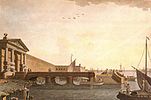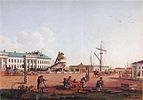Benjamin Patersen: Difference between revisions
No edit summary |
No edit summary |
||
| Line 1: | Line 1: | ||
[[File:Poshtmarko de Rusio de 2001 2-rubla Benjamin Patersen Anglijskaja naberejhnaja u Senata.png|thumb|275px|Russian postage stamp with Patersen's view of the [[English Embankment]].]] |
[[File:Poshtmarko de Rusio de 2001 2-rubla Benjamin Patersen Anglijskaja naberejhnaja u Senata.png|thumb|275px|Russian postage stamp with Patersen's view of the [[English Embankment]].]] |
||
'''Benjamin Patersen''', or '''Patersson''' (Russian: Бенжамен Патерсен; |
'''Benjamin Patersen''', or '''Patersson''' (Russian: Бенжамен Патерсен; September 1748/50, [[Varberg]] - 1814/15, [[Saint Petersburg]]) was a Swedish-born Russian painter and engraver; known primarily for his [[cityscape]]s. |
||
==Biography== |
==Biography== |
||
Revision as of 17:58, 26 August 2016

Benjamin Patersen, or Patersson (Russian: Бенжамен Патерсен; September 1748/50, Varberg - 1814/15, Saint Petersburg) was a Swedish-born Russian painter and engraver; known primarily for his cityscapes.
Biography
His father was a customs clerk. He received his artistic education in Göteborg with a local artist named Frick and became a member of the Society of Artists. From 1774 to 1786, he worked in Riga.[1] In 1787, he went to Saint Petersburg and placed an advertisement in the newspaper, Vedomosti, offering his services as a painter. He was married there in 1791.
He established himself as a portrait and genre painter, but is best known for his views of Saint Petersburg. He created over 100 of them; 33 in oil, the rest watercolors or tinted engravings. Collectively, they represent an irreplaceable historical record of the city as it was at that time.
He never lost touch with Sweden, however. In 1790, he began sending his works to the annual exhibitions at the Royal Swedish Academy of Arts and, in 1798, he was named a member.[1] Around 1800, on a commission by Tsar Paul I, he created a series of works depicting the banks of the Neva, which earned him an appointment as court painter.[1] Most of his works are currently held by the Hermitage and the Pushkin Museum.
Selected works
-
Neva Gate,
Peter and Paul Fortress
References
- ^ a b c Biographical notes @ RusArtNet.
Further reading
- Galina Komelova, Петербург конца XVIII — начала XIX века в акварелях и гравюрах Б. Патерсена (prints and watercolors of B. Patersen), Изобразительное искусство, 1984
External links
![]() Media related to Benjamin Patersen at Wikimedia Commons
Media related to Benjamin Patersen at Wikimedia Commons




